★★★★
“The shark was otherwise engaged, torturing Blake Lively…”
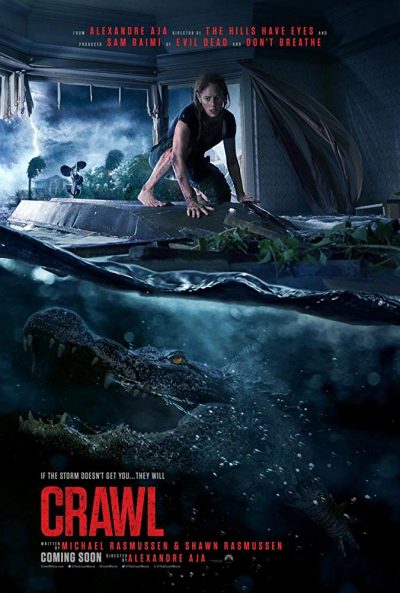
 I have to say, I’m neither an expert on that strange sub-genre of “animal horror,” nor am I a particular fan of it. I’m mainly looking for a movie that can give me a suspenseful time in the cinemas. This is becoming more and more difficult. Partly because in by my time of live, I have has seen quite a lot of movies, of all sorts; but also because I feel modern film makers have forgotten how to create real suspense and a feeling of slowly rising and constant terror in movies.
I have to say, I’m neither an expert on that strange sub-genre of “animal horror,” nor am I a particular fan of it. I’m mainly looking for a movie that can give me a suspenseful time in the cinemas. This is becoming more and more difficult. Partly because in by my time of live, I have has seen quite a lot of movies, of all sorts; but also because I feel modern film makers have forgotten how to create real suspense and a feeling of slowly rising and constant terror in movies.
Mostly we are left with nonsensical pictures of man-killing animals that seem to have supernatural abilities. Usually it’s played for laughs because of all the silliness that comes with these kind of movies. That’s a pity. Sure, as a cinema-goer you can’t expect the greatness of classics like Hitchcock’s The Birds (1963) or Spielberg’s Jaws (1975) an ymore. But is it really that difficult? Create a modicum of interest for the main characters; introduce the predator; put the future victims in an isolated spot with the animals; and play with the ambiguity of the question as to whether said territory is safe at the moment – or not! That’s not rocket science, folks!
But for that you have to take the movie and the characters of your story seriously and the timing of every scene is essential: You’ve got to know where you set up your “beats”. How long can you ratchet up suspense before you’ve got to deliver? Where do you put the shocks, without which you can’t do a good horror movie? Do you put in a little bit of humor and to what degree? When is it time to give some relief to the audience, e. g. with character or relationship moments which seem obligatory background for these kind of stories? Whom do you kill? Whom do you have survive? And should you kill off the family dog or not? 😉
Alexandre Aja is a French film-maker who has got to show his talents across very different horror movies. His great High Tension, a psycho-thriller produced by Luc Besson, was followed by a The Hills Have Eyes remake, the good but not great Kiefer Sutherland vehicle Mirrors and later the (consciously) ridiculous Piranha 3-D. After a good start, in recent years it seemed as if he had lost “it” a bit. So, the offer from producer Sam Raimi to film an original story by Michael and Shawn Rasmussen came at the right time.
While the script has a few humorous moments (if you’re looking for them), it plays its story straight and Aja also focuses on creating genuine suspense and danger. Yet he also delivers in the important categories of shock and gore – something not really that evident from the trailers. That makes sense: you won’t show your climaxes in a trailer of an action movie. I’ve to say my expectations were pretty low when going into the movie. As a fan you know the score, so can a film still get you? To my surprise and delight, this was not only able to do that but also surpassed my expectations by far. But let’s start with some background info on what I want in such a movie.
Though you never expect a character study, I’m always happy if the characters get enough backstory or character traits, that they don’t appear as totally bland, two-dimensional audience stand-ins. That’s definitively true for Crawl‘s main actors Kaya Scodelario and Barry Pepper. Neither had that much luck with past roles: Scodelario, I remember from the Maze Runner movies but hardly seemed to register anywhere else much. I think I saw Pepper last with a supporting villain role in the True Grit remake (2010). I also need predators I like and respect. Some animals won’t really work for me, e. g. bears are simply too sympathetic. But for my money reptiles of all sizes always deliver the goods. And I’ve got an enormous respect for crocodiles or alligators.
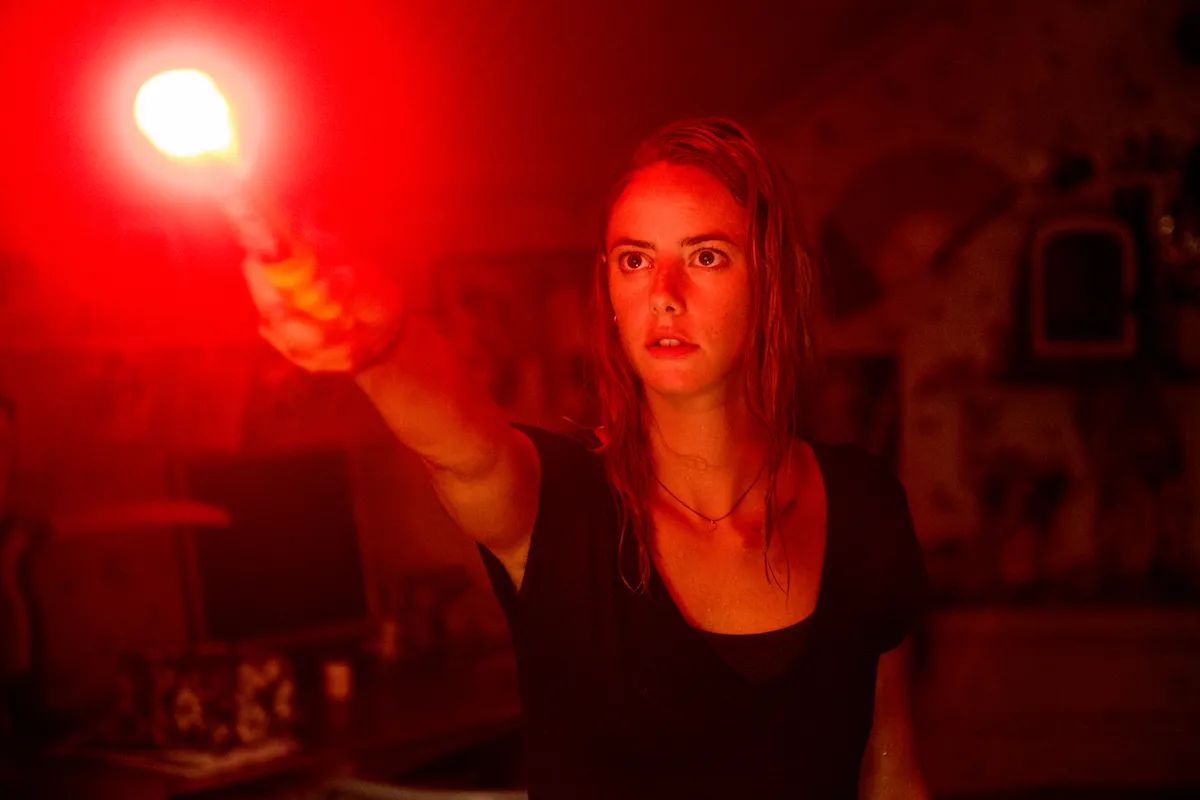 Next, the simple but effective story in a nutshell. Florida, hurricane time. Swimmer Haley Keller (Scodelario), who just failed in a swimming competition, receives a phone call from her sister She’s worried because she couldn’t reach their dad. Neither sister has had much contact with him, since their mother and father divorced; he was Haley’s former trainer, leaving their relationship no on the best of terms. The streets are beiing closed due to the dangers of the approaching hurricane and the rising water levels.
Next, the simple but effective story in a nutshell. Florida, hurricane time. Swimmer Haley Keller (Scodelario), who just failed in a swimming competition, receives a phone call from her sister She’s worried because she couldn’t reach their dad. Neither sister has had much contact with him, since their mother and father divorced; he was Haley’s former trainer, leaving their relationship no on the best of terms. The streets are beiing closed due to the dangers of the approaching hurricane and the rising water levels.
After finding her father’s house abandoned, save for his dog, Haley drives on to their former family house which he was renovating. Following the sound of a radio, she descends into the derelict cellar where she finds Dave, her wounded father (Pepper), who tells her that two alligators have entered the cellar through the drain. While they have some sanctuary in the cellar, they have to make an escape, due to the rising water that is coming up through openings in the cellar floor…
This may sound maybe a bit dry (pun not intended). But, believe me, the screenwriters and Aja have used every trick in the book to push and pull us, the audience, emotionally through our seats, in the same way the alligators push and pull the two likable yet imperfect protagonists through their surroundings. I was very pleasantly surprised about the high level of suspense and tension here. But also how the important ingredients mentioned above were perfectly blended together. The movie really creates suspense and grisly anticipation – yet also doesn’t forget that audiences need moments of relaxation so they can breathe a little, before the next furious attack or moment of extreme danger arrive. It’s a very well-written and executed entertainment, showcasing a kind of story-telling we don’t see much any more.
That said, the movie doesn’t reinvent the wheel. I personally wouldn’t be surprised if the Rasmussens saw two other recent animal horror movies with female leads: Burning Bright (2010) told the story of a young woman, locked together with her autistic brother in a house with a wild tiger by her evil uncle during a hurricane. And, of course The Shallows (2016, is it really already that long ago? It feels as if I saw the film just a couple of weeks ago…), which showed us Blake Lively on a rock in the rising water off an unknown beach while a blood-thirsty shark circles. As a matter of fact, both of these movies would make for a good triple-bill with this. And once Crawl comes out on DVD, it will find its place directly next to them on my shelves!
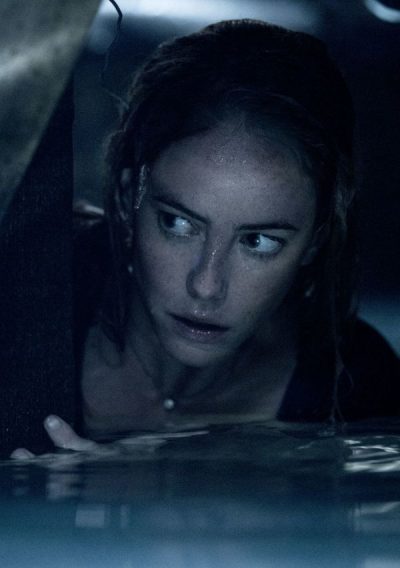 What is it about all those young women fighting predators with large pointy teeth? I’m no psycho-analyst but I guess it has something to do with the re-integration of certain character traits into the female psyche. Whatever these may be. I do remember an early trailer when The Shallows came out that had a voice-over of what sounded like a life coach trainer, encouraging the Blake Lively character. I wonder if the idea of the father who trained his daughter to extraordinary achievements was inspired by that trailer?
What is it about all those young women fighting predators with large pointy teeth? I’m no psycho-analyst but I guess it has something to do with the re-integration of certain character traits into the female psyche. Whatever these may be. I do remember an early trailer when The Shallows came out that had a voice-over of what sounded like a life coach trainer, encouraging the Blake Lively character. I wonder if the idea of the father who trained his daughter to extraordinary achievements was inspired by that trailer?
Actually, this movie goes a different way from some recent action-heroine movies, that looked to discredit father figures or put them in a negative light. Haley may have felt betrayed by her parents divorce and her father “abandoning” her. Yet during the course of the story, she finds out that her parents were not as happy as she thought and that her dad, who always loved her and believed in her, is just a normal guy. [Though I must credit him for absolutely convincing me how every household needs a utility belt for hand tools!] Having to survive and fight for what is left of her family, with the support of her father makes Haley overcome her own anxieties, through facing more than one deadly situation. Certainly, crawling through the drain by which the reptiles came into the house evokes quite distressing birth trauma… That’s a very positive message. After so many negative portrayals of father figures and “family values”, I found this a highly sympathetic and, for 2019, unusually traditional depiction.
But it only has to work – and it does that very well. We are not immediately tossed into shock-infested seas, there’s a nice build-up, so when the gators appear they evoke the desired audience reaction.Haley and her father have enough back story that you are on their side and want them to survive, while at the same time worrying if they will make it. Despite being just that just 90 minutes, the movie is full of ideas of how the imprisoned father-daughter couple could get help from outside (which leads to an unpleasant looter-reptile encounter) or escape the cellar and the house. It really plays with giving you hope, just to take it away again. One of my favourite moments is when Haley and Dave make it to an escape boat outside, when the levees break and a wave of water throws them back into their house – only one floor higher. Well-timed elements of humor, such as Haley’s reaction when normal house spiders fall on her face, help make for very satisfying entertainment.
A fascinating side-fact is that the movie was shot in Belgrade, Serbia, which doubles for Florida perfectly. And a little “tidbit”: Scodelario’s and Pepper’s family name in the movie is “Keller”. For German cinema-goers that’s extremely funny as “Keller” is the German word for “cellar”. But one last question: will the dog survive? Watch the movie to find out! It gets four well-earned stars from me. Your mileage may vary, but honestly I think it’s on the same level as The Shallows, which also scored highly with me. So, if you enjoyed that, this should be right up your (flooded) street.
Dir: Alexandre Aja
Star: Kaya Scodelario, Barry Pepper
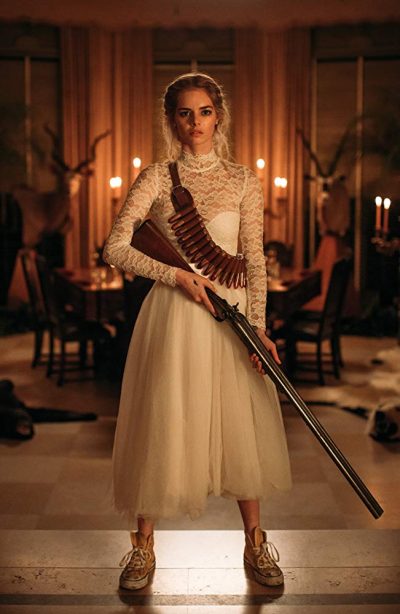 When I settled in to view this, I didn’t realize it starred Weaving, who was the best thing about the very entertaining Guns Akimbo. She’s also the best thing about this, and it largely solidifies my opinion that she’s one to watch in the future. By the end of this, her character has gone through an absolute meat-grinder of punishment, and she is literally drenched in gore. It’s all a very slight work, a comedy-horror that skews heavily towards the first of its genres, and is little more than a disposable bit of fluff. But I’m a sucker for a spot of wedding-dress mayhem – see also Queen’s High and Bloody Mallory.
When I settled in to view this, I didn’t realize it starred Weaving, who was the best thing about the very entertaining Guns Akimbo. She’s also the best thing about this, and it largely solidifies my opinion that she’s one to watch in the future. By the end of this, her character has gone through an absolute meat-grinder of punishment, and she is literally drenched in gore. It’s all a very slight work, a comedy-horror that skews heavily towards the first of its genres, and is little more than a disposable bit of fluff. But I’m a sucker for a spot of wedding-dress mayhem – see also Queen’s High and Bloody Mallory.




 Early 20th-century pulp-fiction author Howard Philips Lovecraft created a substantial corpus of writing, mainly in the short story format and mostly in the form of horrific science fiction which in many ways reads like classic supernatural fiction. The most enduring body of his work has been the novellas and stories making up what has come to be called his Cthulhu Mythos, based on the premise that the prehistoric Earth was dominated by the Great Old Ones, or Elder Gods, malevolent and repulsive, but very powerful and dangerous, alien beings who were ultimately dethroned by another alien race, and whose hidden remnants want to regain their past dominance. A number of Lovecraft works present the idea that these beings have an evil and often murderous cult of human worshipers, handed down from the dawn of mankind, who seek to further their return to power. Numerous later writers have been inspired by HPL’s example to create their own pastiches and spin-offs of the Mythos. Brent Nichols’ self-published Gears of a Mad God novella series (there are six in all), of which this book –set in Canada in May 1921, mainly on Vancouver Island– is the opener, is one of these spin-offs. One of my Goodreads friends gave this one a favorable review; and since I’m a Lovecraft fan and the novella is free for Kindle and relatively short at 98 pages, I downloaded it.
Early 20th-century pulp-fiction author Howard Philips Lovecraft created a substantial corpus of writing, mainly in the short story format and mostly in the form of horrific science fiction which in many ways reads like classic supernatural fiction. The most enduring body of his work has been the novellas and stories making up what has come to be called his Cthulhu Mythos, based on the premise that the prehistoric Earth was dominated by the Great Old Ones, or Elder Gods, malevolent and repulsive, but very powerful and dangerous, alien beings who were ultimately dethroned by another alien race, and whose hidden remnants want to regain their past dominance. A number of Lovecraft works present the idea that these beings have an evil and often murderous cult of human worshipers, handed down from the dawn of mankind, who seek to further their return to power. Numerous later writers have been inspired by HPL’s example to create their own pastiches and spin-offs of the Mythos. Brent Nichols’ self-published Gears of a Mad God novella series (there are six in all), of which this book –set in Canada in May 1921, mainly on Vancouver Island– is the opener, is one of these spin-offs. One of my Goodreads friends gave this one a favorable review; and since I’m a Lovecraft fan and the novella is free for Kindle and relatively short at 98 pages, I downloaded it.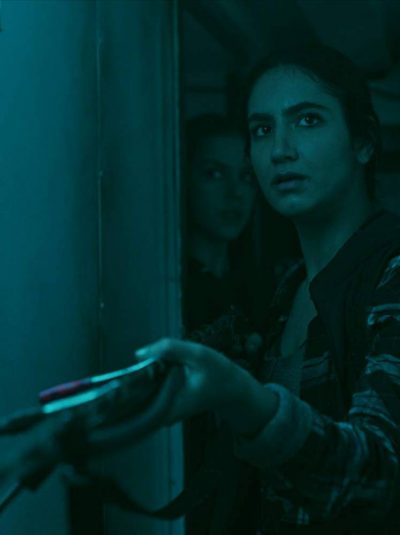 My heart sank in the first few seconds, when I discovered that this was a SyFy Original Movie. The really poor CGI, of a ship sailing on the ocean, seemed to confirm that I was in for one of their bottom of the barrel productions. In the end, however, this was… just about okay. Incredibly derivative, to be sure, and that’s not its only problem. Yet it still just about sustained my interest. That’s certainly not always the case for SyFy Original Movies, to put it mildly.
My heart sank in the first few seconds, when I discovered that this was a SyFy Original Movie. The really poor CGI, of a ship sailing on the ocean, seemed to confirm that I was in for one of their bottom of the barrel productions. In the end, however, this was… just about okay. Incredibly derivative, to be sure, and that’s not its only problem. Yet it still just about sustained my interest. That’s certainly not always the case for SyFy Original Movies, to put it mildly.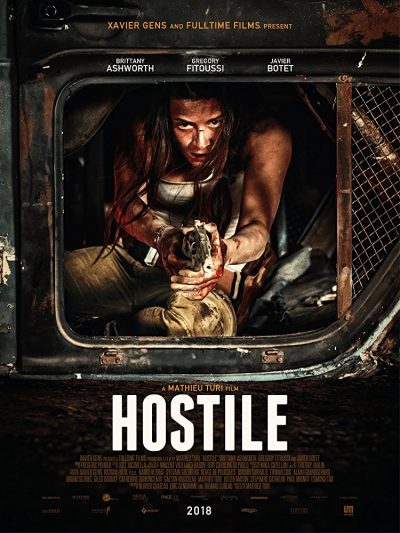 After an un-specified global apocalypse, humanity is reduced to small bands of scattered survivors, who have to try and scratch out survival, while avoiding the attacks of “reapers”, mutated creatures which stalk the landscape, especially after dark. One of those survivors is Juliette (Ashworth), who is on a foraging mission in the desert when an accident throws her off the road, and leaves her with a badly-broken leg. She has to wait for help to arrive, fending off the reaper (Botet) which is prowling the area, with whatever she can find to hand. As she does so, she thinks about life before the apocalypse, where she escaped drug addiction with the help of her boyfriend, gallery owner Jack (Fitoussi) – only for happiness to be fleeting, and taken away from her when multiple tragedies strike.
After an un-specified global apocalypse, humanity is reduced to small bands of scattered survivors, who have to try and scratch out survival, while avoiding the attacks of “reapers”, mutated creatures which stalk the landscape, especially after dark. One of those survivors is Juliette (Ashworth), who is on a foraging mission in the desert when an accident throws her off the road, and leaves her with a badly-broken leg. She has to wait for help to arrive, fending off the reaper (Botet) which is prowling the area, with whatever she can find to hand. As she does so, she thinks about life before the apocalypse, where she escaped drug addiction with the help of her boyfriend, gallery owner Jack (Fitoussi) – only for happiness to be fleeting, and taken away from her when multiple tragedies strike.
 I have to say, I’m neither an expert on that strange sub-genre of “animal horror,” nor am I a particular fan of it. I’m mainly looking for a movie that can give me a suspenseful time in the cinemas. This is becoming more and more difficult. Partly because in by my time of live, I have has seen quite a lot of movies, of all sorts; but also because I feel modern film makers have forgotten how to create real suspense and a feeling of slowly rising and constant terror in movies.
I have to say, I’m neither an expert on that strange sub-genre of “animal horror,” nor am I a particular fan of it. I’m mainly looking for a movie that can give me a suspenseful time in the cinemas. This is becoming more and more difficult. Partly because in by my time of live, I have has seen quite a lot of movies, of all sorts; but also because I feel modern film makers have forgotten how to create real suspense and a feeling of slowly rising and constant terror in movies. Next, the simple but effective story in a nutshell. Florida, hurricane time. Swimmer Haley Keller (Scodelario), who just failed in a swimming competition, receives a phone call from her sister She’s worried because she couldn’t reach their dad. Neither sister has had much contact with him, since their mother and father divorced; he was Haley’s former trainer, leaving their relationship no on the best of terms. The streets are beiing closed due to the dangers of the approaching hurricane and the rising water levels.
Next, the simple but effective story in a nutshell. Florida, hurricane time. Swimmer Haley Keller (Scodelario), who just failed in a swimming competition, receives a phone call from her sister She’s worried because she couldn’t reach their dad. Neither sister has had much contact with him, since their mother and father divorced; he was Haley’s former trainer, leaving their relationship no on the best of terms. The streets are beiing closed due to the dangers of the approaching hurricane and the rising water levels. What is it about all those young women fighting predators with large pointy teeth? I’m no psycho-analyst but I guess it has something to do with the re-integration of certain character traits into the female psyche. Whatever these may be. I do remember an early trailer when The Shallows came out that had a voice-over of what sounded like a life coach trainer, encouraging the Blake Lively character. I wonder if the idea of the father who trained his daughter to extraordinary achievements was inspired by that trailer?
What is it about all those young women fighting predators with large pointy teeth? I’m no psycho-analyst but I guess it has something to do with the re-integration of certain character traits into the female psyche. Whatever these may be. I do remember an early trailer when The Shallows came out that had a voice-over of what sounded like a life coach trainer, encouraging the Blake Lively character. I wonder if the idea of the father who trained his daughter to extraordinary achievements was inspired by that trailer?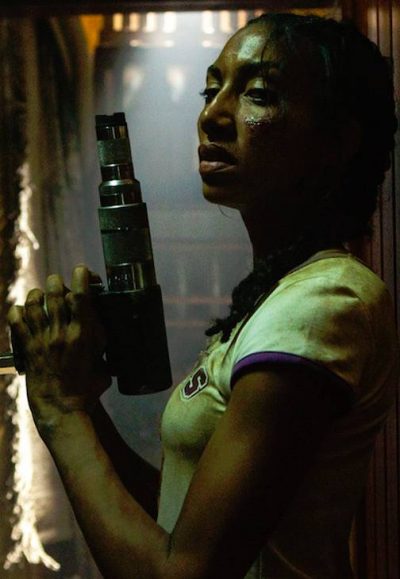
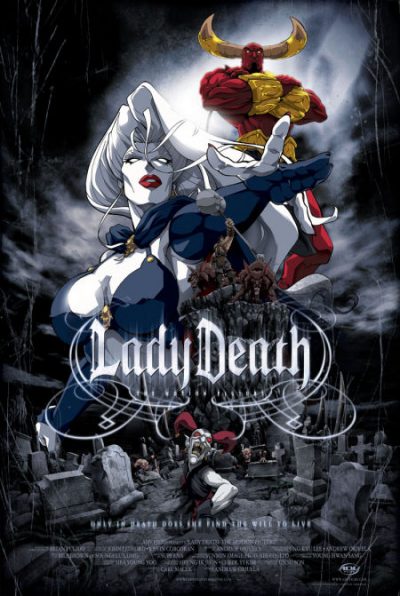 My first viewing of this was on a day off from work, when I was down with some sinusy thing, and dosed up on DayQuil. So I chalked my losing interest and drifting off to the meds, and once I felt better, decided this deserved the chance of a re-view. However, the result was still the same: even as a bright-eyed and bushy-tailed viewer, I found attention lapsing. For this animated version of a mature comic, might as well be a He-Man and the Masters of the Universe episode. Which is a shame. I wanted to like it, since the creator of Lady Death, Brian Pulido, is something of a local comics legend here in my adopted home state of Arizona. This should have been better.
My first viewing of this was on a day off from work, when I was down with some sinusy thing, and dosed up on DayQuil. So I chalked my losing interest and drifting off to the meds, and once I felt better, decided this deserved the chance of a re-view. However, the result was still the same: even as a bright-eyed and bushy-tailed viewer, I found attention lapsing. For this animated version of a mature comic, might as well be a He-Man and the Masters of the Universe episode. Which is a shame. I wanted to like it, since the creator of Lady Death, Brian Pulido, is something of a local comics legend here in my adopted home state of Arizona. This should have been better.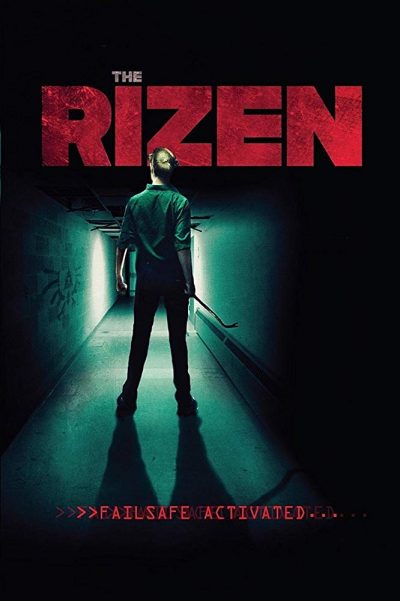 This is about the third Lovecraftian film I’ve seen with a heroine in the past year or so, after
This is about the third Lovecraftian film I’ve seen with a heroine in the past year or so, after 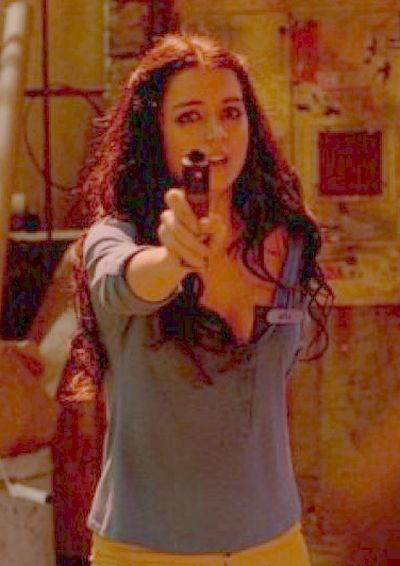 Wannabe actress Rosa (de Armas) is on the way home from her job as a hotel maid when she gets a message telling her she has a call-back the next day for a final audition. With her washing machine broken, she pops into the local 24-hour laundromat to get her costume all spick and span. It and the surrounding streets are completely deserted, and it’s not long before she’s being menaced by the kind of hulking, silent figure only found in horror movies like this. She’s delighted when hunky co-launderer Gabriel (Cadavid) shows up to rescue her, despite his strange tastes in music. But is he really as nice as he seems?
Wannabe actress Rosa (de Armas) is on the way home from her job as a hotel maid when she gets a message telling her she has a call-back the next day for a final audition. With her washing machine broken, she pops into the local 24-hour laundromat to get her costume all spick and span. It and the surrounding streets are completely deserted, and it’s not long before she’s being menaced by the kind of hulking, silent figure only found in horror movies like this. She’s delighted when hunky co-launderer Gabriel (Cadavid) shows up to rescue her, despite his strange tastes in music. But is he really as nice as he seems? I usually try to be tolerant when it comes to low-budget cinema and the resulting flaws. There are some things which you just cannot expect when a film is financed on the maker’s credit-card, and I’m willing to overlook rough edges if a movie can hold my interest in other ways. However, there are times when the end product is almost irredeemably bad, with few, if any, merits. This would be one such case. Your script is the main area which should be an area of equal opportunity, regardless of budget. Here, if anything, the flaws at the technical level are magnified by the failings on the page.
I usually try to be tolerant when it comes to low-budget cinema and the resulting flaws. There are some things which you just cannot expect when a film is financed on the maker’s credit-card, and I’m willing to overlook rough edges if a movie can hold my interest in other ways. However, there are times when the end product is almost irredeemably bad, with few, if any, merits. This would be one such case. Your script is the main area which should be an area of equal opportunity, regardless of budget. Here, if anything, the flaws at the technical level are magnified by the failings on the page.